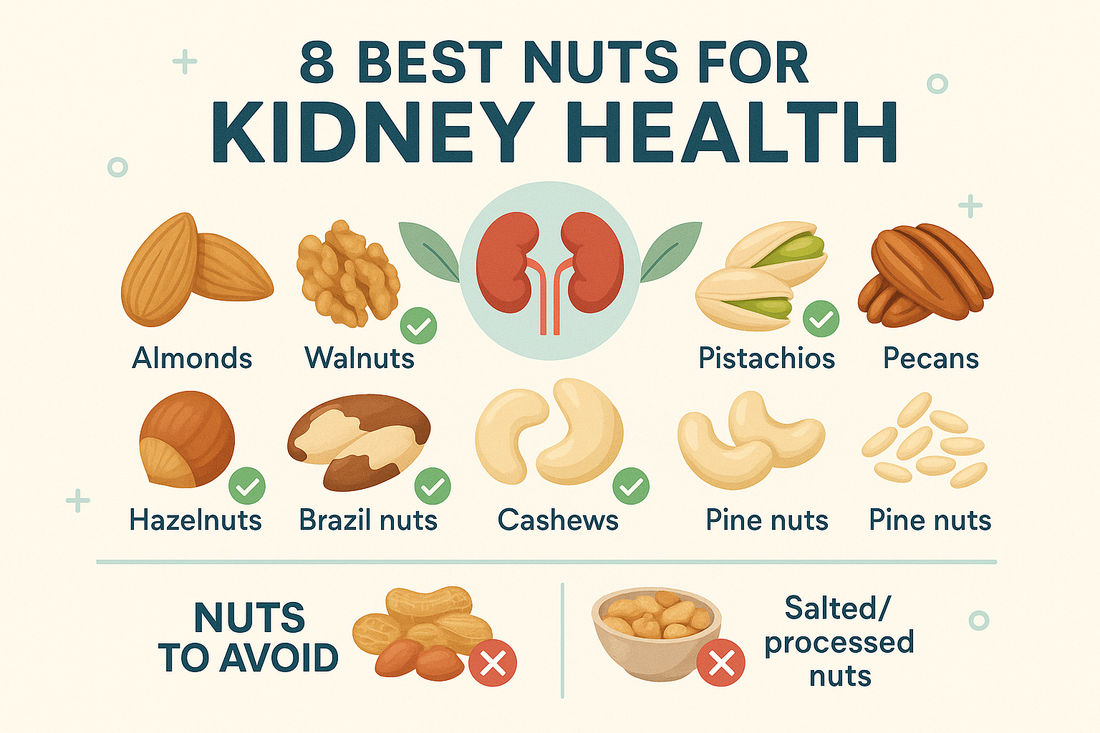
8 Best Nuts for Kidney Health (+ Which Ones to Avoid)
Share
Are you eating nuts that could be harming your kidneys without realizing it? If you're managing chronic kidney disease, high blood pressure, or diabetes, choosing the right nuts can make a significant difference in your kidney function.
In this comprehensive guide, you'll discover the eight best nuts for kidney health that support your filtration system, help lower creatinine levels naturally, and protect against long-term damage. You'll also learn which types to avoid and get a powerful bonus tip for daily kidney detox.
In this guide:
- 8 kidney-safe nuts with exact serving sizes
- Which nuts to avoid if you have CKD
- How nuts support filtration and reduce inflammation
- Bonus kidney detox tip using herbal teas
- Complete quick-reference table
1. Macadamia Nuts: The Low-Mineral Champion
Why Macadamia Nuts Are Kidney-Friendly
Macadamia nuts stand out because they are low in both phosphorus and potassium, crucial for anyone with impaired kidney function. A single serving contains significantly lower levels of these minerals than almonds, cashews, or peanuts, making them safer options.
Heart-Healthy Fats That Protect Your Kidneys
Macadamias are high in monounsaturated fats, which help lower bad cholesterol and reduce arterial strain. Improved cardiovascular health directly benefits your kidneys by enhancing circulation and nutrient delivery to nephron tissues.
Anti-Inflammatory Benefits for CKD Patients
Macadamias contain inflammation-fighting flavonoids and tocotrienols that lower C-reactive protein levels, reducing inflammation and oxidative stress inside the kidneys.
Recommended Serving: 5–6 raw or dry-roasted macadamia nuts daily. Avoid salted or coated varieties.
2. Hazelnuts: Antioxidant Powerhouse for Kidney Protection
Hazelnuts have moderate phosphorus and potassium levels, making them balanced for CKD diets. They are rich in vitamin E and manganese, key antioxidants that protect kidney cells from oxidative damage.
Recommended Serving: 10–12 raw or dry-roasted hazelnuts daily. Avoid flavored or sugar-coated versions.
3. Pine Nuts: Low-Oxalate Option for Stone Prevention
Pine nuts are low in oxalates, reducing kidney stone risk. They also provide vitamin K and magnesium for calcium regulation and blood pressure control.
Recommended Serving: 1 tablespoon of unsalted pine nuts daily. Store in the refrigerator to maintain freshness.
4. Pecans: Heart-Healthy Fats with Minimal Kidney Stress
Pecans have low phosphorus and potassium content, making them kidney-safe. They are rich in antioxidants like ellagic acid that protect kidney tissue from inflammation.
Recommended Serving: 5–7 pecan halves daily, raw or lightly toasted. Avoid candied versions.
5. Walnuts: Omega-3s for Inflammation and Better Sleep
Walnuts provide alpha-linolenic acid, a plant-based omega-3 that reduces inflammation in kidney tissues. They also contain melatonin, which supports nighttime kidney repair and better rest.
Recommended Serving: 7 walnut halves daily, raw or unsalted.
6. Pistachios: Blood Sugar Support with Lower Potassium
Pistachios are lower in potassium than many nuts, helping prevent dangerous potassium buildup. They’re rich in vitamin B6 for better protein metabolism and contain antioxidants like lutein for vascular protection.
Recommended Serving: 15–20 dry-roasted, unsalted pistachios daily.
7. Brazil Nuts: Selenium-Rich but Use Sparingly
Brazil nuts are a top selenium source that boosts antioxidant enzyme activity and kidney protection. However, excess selenium can be toxic, so moderation is key.
Recommended Serving: 1–2 raw Brazil nuts daily. Avoid Brazil nut oil or flour to prevent excess intake.
8. Cashews: Low-Oxalate with Zinc and Magnesium
Cashews are lower in oxalates and provide zinc, copper, and magnesium for kidney cell repair and detoxification. They help regulate calcium and phosphate balance, supporting efficient filtration.
Recommended Serving: ¼ cup raw, unsalted cashews daily. Avoid roasted or salted types.
Bonus: Herbal Teas for Daily Kidney Detox
Dandelion root and nettle leaf teas act as natural diuretics, helping flush excess sodium and toxins. Rich in flavonoids, they protect delicate kidney tissues from oxidative stress.
Preparation: Use 1 teaspoon dried herb or 1 tea bag per 8 oz of hot water. Steep 10 minutes and drink once daily. Consult your doctor if you take diuretics.
Quick Reference Guide: Kidney-Friendly Nuts at a Glance
| Nut | Serving Size | Key Benefit | Important Note |
|---|---|---|---|
| Macadamia | 5–6 nuts | Low phosphorus & potassium | Avoid salted versions |
| Hazelnuts | 10–12 nuts | High vitamin E & manganese | Dry-roasted only |
| Pine Nuts | 1 tbsp | Low oxalates | Store in refrigerator |
| Pecans | 5–7 halves | Low minerals, high antioxidants | Skip candied types |
| Walnuts | 7 halves | Omega-3s & melatonin | Eat raw |
| Pistachios | 15–20 nuts | Lower potassium | Unsalted only |
| Brazil Nuts | 1–2 nuts | Selenium-rich | Limit strictly |
| Cashews | ¼ cup | Zinc, copper, magnesium | Raw, unsalted |
FAQs
Can kidney patients eat peanuts?
Peanuts are legumes high in phosphorus and potassium. CKD patients should limit or avoid them unless approved by their doctor.
Which nuts are highest in potassium and should be avoided?
Almonds, pistachios (in large amounts), and peanuts are high in potassium. Choose macadamias, pecans, or pine nuts instead.
Can I eat nut butter if I have kidney disease?
Yes, if unsalted and single-ingredient. Limit to 1–2 tablespoons daily and avoid added oils or sugars.
How do nuts help lower creatinine levels?
Nuts don’t directly lower creatinine but support kidney health by reducing inflammation and oxidative stress, stabilizing levels over time.
Are roasted nuts bad for kidneys?
Dry-roasted unsalted nuts are fine. Avoid oil-roasted or heavily salted ones to prevent inflammation and sodium overload.
Can diabetics with kidney disease eat nuts?
Yes, nuts stabilize blood sugar and support kidney health. Prefer low-potassium types like macadamias or pecans.
What time of day is best to eat nuts for kidney health?
Anytime is fine. Mid-morning or afternoon snacks work best. Avoid large servings late at night.
Should I soak nuts before eating them?
Soaking reduces phytic acid slightly but doesn’t lower minerals significantly. Choose the right nut type over soaking for kidney safety.
